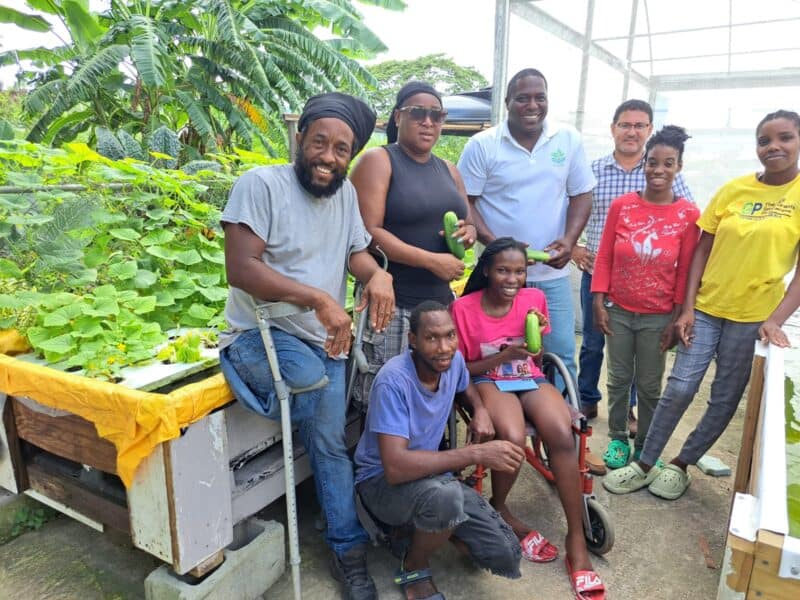
A recent hands-on training session aimed at empowering small-scale farmers with the knowledge to use digital sensors in protected cultivation and open field systems led jointly by the Food and Agriculture Organization of the United Nations (FAO) and the Ministry of Agriculture, Fisheries and Barbuda Affairs has concluded at Indies Greens Farm, Upper Renfrew in Antigua. A total of 25 participants including farmers and government staff gained practical experience with cutting-edge sensor technologies that are transforming the agricultural landscape, helping farmers improve crop management and productivity.
Held under the project, “Digital Solutions to Improve Horticultural Crop Management in the Caribbean”, the workshop covered essential sensor applications, including the operation of water, soil, and environmental sensors. Demonstrations focused on connecting hardware components, activating sensors, and utilizing software platforms to track and analyze key agricultural parameters. Through these demonstrations, participants learned how these sensors provide real-time data on soil moisture, nutrient levels, and environmental conditions, enabling farmers to make more informed decisions.
During his opening remarks, Ika Fergus, FAO National Correspondent, Ministry of Agriculture stated that “over the past years farmers continue to face unprecedented challenges relating to agricultural production and livelihood security, particularly access to water resources. Optimizing existing production systems by strengthening the capacity of our farmers to produce more food, using climate-smart, digital innovations and solutions in agriculture commissioned by FAO, will serve as an important conduit to supporting efforts of attaining sustainable and competitive Agrifood systems in our twin island state.”
Melvin Medina Navarro, FAO’s Lead Technical Officer, provided an insightful introduction to sensor technology and its use in agriculture. He stated, “digital agriculture provides a flexible, cost-effective solution to increase crop yield and productivity, particularly for small-scale producers. With the right technology, farmers can optimize irrigation, reduce waste, and monitor crops efficiently, leading to better yields and greater profitability.”
The use of soil sensors to measure soil moisture levels, for instance, allows farmers to make precise irrigation decisions, conserving water and minimizing resource waste. Environmental sensors offer real-time data that supports tracking of a wide range of parameters, while mobile access to this data empowers farmers to take timely actions to protect crops, improve productivity and enhance food security and safety.
This initiative is part of an ongoing project designed to promote the adoption of innovative, affordable agricultural technologies. The project seeks to equip farmers in Antigua and Barbuda with digital sensors and tools to pilot these low-cost solutions, enabling year-round cultivation of high-value crops.
“This digital sensor training would make a major difference for small-scale producers in Antigua and Barbuda, the hands-on training demonstrates how real-time data can improve how we irrigate, use climate information together with traditional methods to increase production for food security and income”, was expressed by Neil Gomes, a local farmer and workshop participant.
The recent workshop featured both classroom and outdoor training which were led by Laurence Francis, FAO’s National Project Coordinator of Digital Agriculture, while Juan Garcia, Head of Product, Iyris based in United Arab Emirates delivered his training on the sensors virtually.

Advertise with the mоѕt vіѕіtеd nеwѕ ѕіtе іn Antigua!
We offer fully customizable and flexible digital marketing packages.
Contact us at [email protected]
















